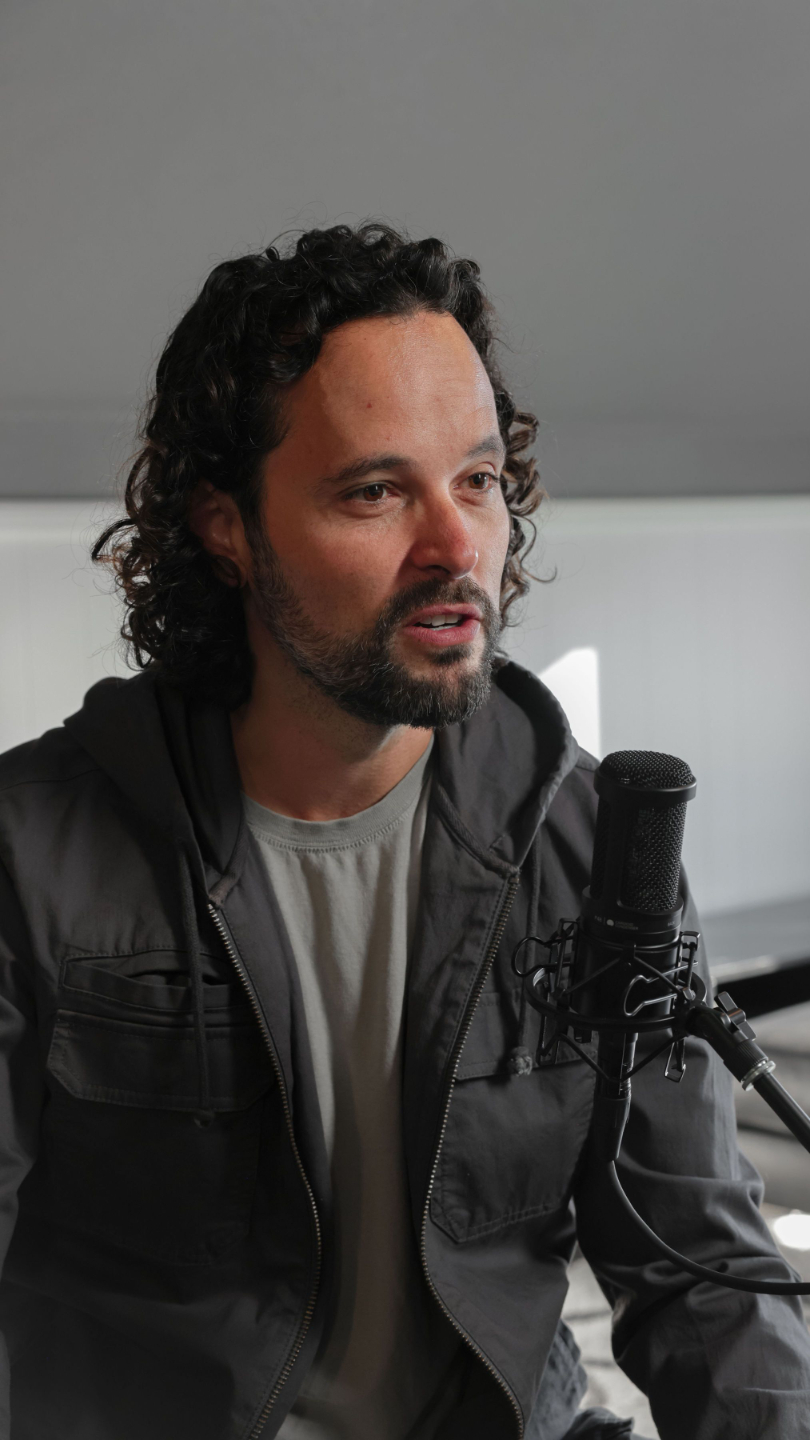She’s Upset. You React. And Now It’s Worse. (Here’s What to Do Instead)
When She’s Upset and You React Fast
Today's episode is all about a topic that almost every man that I talk to struggles with: being reactive when their wife is upset or emotional or confrontational.
Now the reactions vary from shutting down, getting defensive or pushing back, but they all have this in common. They make things worse, not better. So let's paint a picture. You're having a pretty good day until something small happens. She says something that gets to you, maybe your chest tightens or your gut wrenches, or your jaw clenches and you react and just like that you're in it again.
You didn't wanna fight, you didn't mean to shut down, but your body took over. Your reaction moved faster than your mind. Now things are tense again, and later you're left wondering, why do I keep reacting like that? In today's episode, we're talking about that split second difference between reaction and connection, and the exact shift that helps you change from how you respond to challenges in your marriage.
This is a huge part of what I teach in Level three of Better Husband Academy. And if you've ever walked away from a moment with your wife thinking I should have handled that better, this episode is for you. So let's get started.
Welcome to Better Husband, the podcast that helps you answer the question, how can I be a better husband?
I'm Angelo Santiago, a men's marriage and relationship coach, and each week I bring you practical insights to help you strengthen your marriage and become the best husband you can be.
Why You React Before You Think
Let's start with something most guys get, but don't realize how much it affects their marriage. Throughout your life, you've trained yourself to react fast.
When something needs to happen, you make it happen. You take control, you solve the problem, you move. That kind of instinct serves you in a lot of places. At work. In an emergency when things get unpredictable, but in your marriage, that quick reaction doesn't always help. In fact, it often makes things worse.
Maybe you raise your voice before you realize it, or you shut down because the conversation feels too big. You snap, deflect or try to fix it without actually being present to the moment and acknowledging what she really needs from you. And it's all because you're moving too fast to connect. That's it.
The Power of the Pause
The real work for so many men is learning how to slow down, especially when things are uncomfortable, and to add a pause between what's happening and what you do next. Because when you create just a little bit of space, when you take a little bit more time, you give yourself the ability to respond instead of react, and that right there, that pause opens the possibility to doing something different than your automatic response.
Now I get it. Most of us want to get out of the discomfort as fast as possible. I remember times when my wife was sad or crying, and all I could think about was how to make it stop. What can I say to fix this? What can I do to make her feel better? Or when she was upset with me, I'd shut down. I'd go silent and just start counting down the minutes until it was all over and we could go to bed.
I didn't wanna spend a second longer in that discomfort than I had to, and yet learning to stay in it, that discomfort is exactly what I needed to do. And here's the simple strategy that helped me: first pause. Don't do anything when you feel the urge to take action or react. Stop. But don't shut down or close off.
Stay in the discomfort for a little longer than you probably would like.
A Simple Way to Stay Grounded
Then take a breath. In through the nose, out through the mouth, and it might sound a little silly, but I'm telling you it works. The pause is one of the most underrated skills in marriage. Most guys don't think of it as a tool.
I. They think relational tools are all about action. Words fixing. When emotions are high, and your instinct is to react, whether it's to raise your voice, shut down, or defend yourself. That's the moment you need the pause the most, and I mean that literally. You stop, you breathe, you slow your body and your mind down.
In relational life therapy, we talk about how important it is to create just a little space between what's happening and what you do next. Why? Because when your nervous system is flooded, when you're in that fight, flight, or fix mode, you don't have full access to your ability to listen, reflect, or connect. You're not in relationship mode.
You're in protection mode. But here's the good news. Your body has a built in reset button. It's your breath. One deep breath can begin to activate your parasympathetic nervous system. The part of you that calms down comes back online and helps you get present again. So when you feel that surge of emotion, when everything in you wants to do what you've always done, this is your practice.
Stop. Breathe in slowly through your nose. Exhale even slower through your mouth. Feel your feet on the floor. Come back to your body. Come back to the present moment, not what you want to do next, and remind yourself, I don't need to fix this right now. I'm not in any danger. I just need to stay present with the person who I love.
That's it. Stay present. Stay available. Don't run. Don't shut down. Don't push. Even if you don't have the right words yet, even if you're unsure of what to do next, your presence right now matters more than your next move. And from that grounded place, from that pause, you can focus on being relational. And that's exactly where we're going next.
Because once you've taken that pause, once you've got your feet under you again, it's time to lead with a different strategy. And let's talk about that.
Now that you've learned how to pause, how to stay present and grounded, even in the heat of the moment, what comes next? Well, this is where we move from what not to do, into what to do instead. If you've been listening to the podcast for a while, you've probably heard me talk about the five losing strategies.
That's where we start because you have to understand what's not working before you can change it. You have to recognize the ways you've been reacting that shut down connection, even if your intentions were good. But once you see those patterns clearly, and once you learn to catch yourself in the moment, the next step is learning how to show up differently.
That's where the five winning strategies come in. Today I want to talk about two of those strategies.
Strategy #1: Listening to Understand
The first is listen to understand. The second is speak to make things better. So let's start with listening. A lot of times, one of the hardest things for men to do in the middle of conflict is actually listen, not fix, not debate, not plan your next move while she's still talking.
Just listen to understand what your wife is feeling and what she needs. And if that's hard for you, I get it. We're taught to act fast, to solve problems, to stay in control. So when something's wrong, your brain kicks into gear and says, okay, how do I fix this? But in marriage, fixing isn't always what's needed.
Sometimes your partner just needs to be heard, to be felt, to know that you're with her in whatever she's going through. Listening to understand is about slowing down, getting curious, asking what's going on for her right now? Not how do I fix this, or how do I defend myself?
Here's what this looks like. You're not interrupting. You're not trying to poke holes in her feelings. You're not jumping to conclusions, you're staying present. You're tracking her. You're saying things like, can you tell me more? Or, what do you need right now? Or, I wanna understand what this is like for you, and here's the most important part.
You don't move on until she feels seen and heard. When you can empathize with what she's going through, that's your job. In this situation, listen to understand, and when you do that well, when you really get where she's coming from, then it's time to speak. So once your partner feels heard, now you have a window, a moment where what you say next actually matters.
Strategy #2: Speaking to Make Things Better
This is where the second strategy comes in speak to make things better. Your job now is to use your words to serve the relationship, to add value, to help your partner feel supported, not dismissed. Most men default to one of two modes, say nothing and disappear emotionally or talk fast and try to fix the issue or win the argument.
But neither of those strategies help your marriage. So what does, well, it starts with checking your intention. Ask yourself what would help her right now? How can I truly be of service to what she needs? And here's the key. Don't guess you can ask. You can say, what can I do right now to help you? Or is there anything you need to hear from me?
Sometimes she needs a reassuring word. Sometimes she needs a plan. Sometimes she just needs to know that you see her and that you're not going anywhere. The goal is just to be with her, which is actually a lot easier than trying to fix her. You're here to speak in a way that makes her feel loved, safe, like she has a partner.
Here's what I want you to see from all of this. When you pause, instead of snap, when you ask, instead of assume, when you listen, instead of defend, you create safety, clarity, and connection. It doesn't mean things are always smooth, but it does mean that even in the hard moments, you stay grounded, and that's what I want for you.
Better Husband Academy: Your Next Step
If this is making sense and feels helpful, if you're starting to see what's possible when you stop reacting and start connecting, then Better Husband Academy is your next step. And let me tell you what it is, because if you're new here, this might be the first time you're hearing about it. Better Husband Academy is a space I've created for men who want real growth in their marriage without guessing and without going at it alone.
It's a self-paced online course with four levels covering everything you need to improve how you show up as a husband, from ownership to emotional regulation to relational leadership. You also get two live group coaching calls each month where you can ask questions, share wins, get support from me directly, and connect with other men who are on the same path.
It's a space to build real relational skills to take action, to ask the hard questions that are holding you back and finally get answers that move you forward. And most of all, it's a space for men who are ready to make a change. Men who want to become the husband they promised they'd be, and the man their wife, hopes they still can be.
Inside level three we go deep into everything we've been talking about today, how to manage your reactivity without shutting down, how to stay grounded in conflict, how to listen with presence and speak in a way that brings real connection. If that's the work you know you need to do and you're ready for structure, support and accountability to actually follow through better Husband Academy is for you.
Go to better husband academy.com and get on the wait list. You'll be the first to know when doors open and you'll get access to an exclusive discounted rate and bonuses I'm only offering during this launch. I'd love for you to be a part of it. Get on the wait list today by going to better husband academy.com or clicking the link in the show notes and I'll see you there.
Okay.
Reflection Questions and Closing Thoughts
Let's end with some quick reflection questions for you to sit with. Where in your marriage do you tend to react immediately without taking a moment to process? What might change if you added a pause in that moment? What's one thing you could say differently this week to make things better?
Take a moment to sit with these questions and even write down your answers. If that's helpful. Then I want you to try out the pause and the breath. Then if you feel called to let me know how it goes. I'd love to hear from you. So thanks for being here.
If this episode helped you, share it with a friend, leave a review, spread the word, and if you're serious about growing, join the wait list for Better Husband academy at betterhusbandacademy.com. I'm Angelo Santiago, and I'll see you next time.







